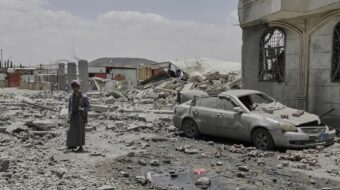Israel: Pilots refuse to commit war crimes
Twenty-seven Israeli F-16 fighter jet pilots of the air force reserve, including nine on active duty, declared on Sept. 25 that, for reasons of conscience, they refuse to carry out targeted assassinations and other attacks against Palestinian militia members and civilians in the Gaza Strip, the West Bank and other places.
Air Force Chief Commander Gen. Dan Halutz immediately threatened the pilots with expulsion from the air force, court martial, and lifelong prison terms for high treason.
The pilots rejected these threats, arguing that under international law they can refuse to commit crimes against humanity. They also said the occupation of Palestinian Gaza and the West Bank is imperiling the security and moral fiber of Israel.
The 27 pilots join about 600 army officers and soldiers who have refused to serve in the occupied territories. Many of these have been sentenced to stockade jail terms and have served time; five are currently standing trial.
The peace forces in Israel have expressed their solidarity with the pilots, calling them “the true patriots of Israel” and “the Magnificent 27.”
Bolivia: Big demos vs. gas export plan
Workers, students and indigenous organizations – among them two major labor federations – vowed this week to shut down Bolivia in protest over the government’s plan to export huge gas reserves in the Chaco region. Under the plan put forward by the government of President Gonzalo Sanchez de Lozada, the gas would be routed through Chile, where it would be liquefied, to a regasification plant in Mexico and finally to energy firms in California.
The government claims exporting the gas is essential to reduce hunger and create jobs in the impoverished country. But Aymara Indian leader Felipe Quispe, a prominent government opponent, emphasized in an interview with Knight-Ridder newspapers that the gas belongs to Bolivia.
“We should use the gas to industrialize Bolivia,” Quispe said. “Once the country is industrialized, we can sell it abroad.”
Three foreign companies – British Gas, Repsol-YPF of Spain and Pan American Energy– own the gas reserves. The involvement of U.S.-based transnationals in the proposed deal has intensified the popular outrage.
Canada: Gays protected by anti-hate laws
Canadian gays, lesbians and bisexuals achieved another victory with last month’s 141-110 vote in Parliament to okay Bill-250. The measure, sponsored by New Democratic Party MP Svend Robinson, includes the targeting of gays and lesbians under the Criminal Code’s law banning hate propaganda.
Bill-250 adds the term “sexual orientation” to the Hate Propaganda Law under the Canadian Criminal Code. Until recently, the law only banned incitement of hatred against “identifiable groups” distinguished by color, race, religion and ethnic origin. The measure must now be passed by Canada’s Senate to become law.
Meantime, on Sept. 16 Parliament voted 137-132 to oppose a motion by the far-right Canadian Alliance affirming marriage as being between a man and a woman. In June, the federal government presented a draft bill legalizing same sex marriage to the Supreme Court to make sure it is constitutional. However, the bill is not expected to be introduced in Parliament for another year.
Liberia: UNICEF launches emergency appeal
The United Nations children’s fund (UNICEF) is making an emergency appeal for $7 million to get 750,000 children back into school quickly, and demobilize up to 15,000 child soldiers, the UN news service announced last week. Funds will also be used for health and water supply programs helping women and children.
Cyrille Niameogo, UNICEF country representative in Liberia, said the 14-year civil war there has displaced a million people – one-third of the total population.
In the final stages of the war last summer, all remaining schools closed. But even before then, the situation was so serious that in the last two years only about half of school age children were in class. Some 60 percent of Liberians, and 74 percent of women, are illiterate.
Poland: Miners protest restructuring
Polish coal miners launched a protest against government plans to restructure their industry, as thousands blocked roads Sept. 26. Calling their action “the total blockade of Silesia,” the miners peacefully halted traffic on major roadways in Silesia’s industrial core. They expressed outrage that the Social Democratic government refuses to discuss its plan to close four area mines next year. Talks between the government and miners broke down earlier in the week.
Last week’s action was the latest in a wave of protests including a very large rally in Warsaw last month. Unemployment in Silesia is estimated to be twice the already high national rate of 18 percent. But in its efforts to get World Bank funds to bail out the heavily indebted coal industry, the government wants to cut production and lay off 14,000 workers.
International Notes are compiled by Marilyn Bechtel (cpusainternat@mindspring.com). Hans Lebrecht and Tim Pelzer contributed to this week’s notes.









